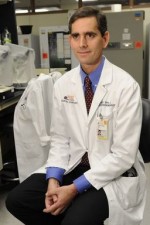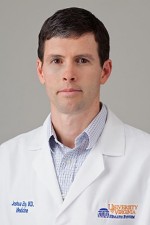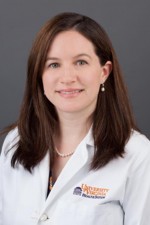Clinical
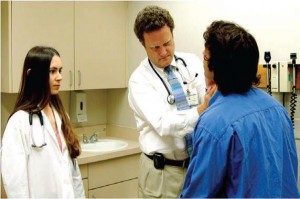
Brian Wispelwey (Division of Infectious Diseases, Department of Medicine), with trainee and patient.
Division of Infectious Diseases & International Health
CLINICAL ACTIVITIES
The division’s 18 clinical faculty members provide care and clinical expertise in infectious diseases at UVA Medical Center’s inpatient medical wards, through a busy consult service and at the division’s outpatient clinics. They manage virtually all infectious disease cases at University Hospital, with specific areas of expertise in:
- Antibiotic resistance – Amy Mathers, MD
- Diarrheal diseases – William Petri Jr., MD, PhD
- Fungal infections – Gerald Donowitz, MD; W. Michael Scheld, MD
- HIV medicine – Rebecca Dillingham, MD, MHP; Christopher Moore, MD; W. Michael Scheld, MD; Gregory Townsend, MD; Brian Wispelwey, MD
- Infections in cancer patients – Gerald Donowitz, MD; Costi Sifri, MD; Brian Wispelwey, MD
- Meningitis and brain abscess – W. Michael Scheld, MD; Brian Wispelwey, MD
- Nosocomial (healthcare-associated) infections and hospital epidemiology –Costi Sifri, MD
- Pneumonia – Gerald Donowitz, MD; Eric Houpt, MD
- Sexually transmitted diseases – Joshua Eby, MD; Cirle Warren, MD
- C. difficile – Cirle Warren, MD
- Hepatitis C – Rebecca Dillingham, MD, MHP; Gregory Townsend, MD
- Tick-borne diseases – William Petri Jr., MD, PhD; W. Michael Scheld, MD
- Transplant-related infectious diseases – Gerald Donowitz, MD; Costi Sifri, MD; Brian Wispelwey, MD
- Tropical medicine – Erik Hewlett, MD; Eric Houpt, MD; Molly Hughes, MD; Richard Pearson, MD; William Petri Jr., MD, PhD
- Tuberculosis – Scott Heysell, MD, MHP; Eric Houpt, MD; Tania Thomas, MD
Division faculty members provide substantial inpatient care on the general medicine wards; in FY 2015, about one-third of attending staffing was supplied by ID physicians, who exceeded the 90th percentile in University Health System Consortium (UHC) measures of productivity. They also provide consultations in infectious diseases and transplant infectious diseases at University Hospital — more than 7,000 in FY 2015 — and lead or co-lead the medical center’s infection control, formulary, and antibiotic utilization committees.
The division will expand its clinical capacity in FY 2016 by adding four junior faculty members and an attending consult service, in order to accommodate the increased demand for consults.
Infection Control Program
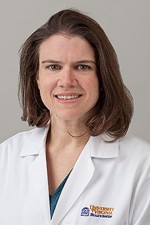
Amy Mathers, MD, head of University Hospital’s Antibiotic Stewardship program.
Amy Mathers, MD, leads the UVA Medical Center-wide Antibiotic Stewardship Program, initiated in 2009 to address the dual problems of increased antimicrobial resistance and declining new antimicrobials. The program’s efforts to reduce antibiotic use have resulted in an on-going savings for UVA Medical Center and improved quality of care for patients.
Focus on Quality
Under Joshua Eby, MD, the quality officer for the division, ID continues to focus on quality improvement (QI) in both its clinical and educational missions. Of the division’s 18 clinicians, 15 maintain inpatient activities and ten serve as attendings on the hospital’s General Medicine wards,
where they have oversight of a group of internal medicine residents. ID attendings enjoy excellent performance and teaching ratings, and contribute to more than 30 percent of the attending blocks per year on General Medicine wards. The unweighted mean mortality index for an ID attending physician during FY 2015 was 0.63 compared to an overall medicine index of just under 1.0.
One goal over the past year has been incorporating ID fellows more actively in QI efforts. Fellows are now required to present annually at morbidity and mortality conferences (M&Ms), which are attended by faculty, students and fellows; this means the division has at least six M&M conferences per year.
The division has also started a fellows’ QI meeting to work on a project in this area. Through the systems-engineering skills of Stephanie Guerlain, PhD, it has been possible to track and record the fellows’ clinical activities; the resulting time-motion study data will be analyzed and schedules adjusted by the QI fellows group with the aim of reducing wasted time and/or efforts in trainees’ schedules. The ultimate goal is — as always — improving patient safety.
Other division QI projects, most of which are ongoing, and many of which are tied to UVA Health System quality goals, include:
Q17: Pneumonia Core Measures
The goal was improving the consistency and quality of community-acquired pneumonia (CAP) management across the medical center, in accordance with professional guidelines and standards of care. During a six-month period (April–September 2014) in which pneumonia core measurements were tracked, ID achieved 100 percent compliance with guidelines, which exceeded team goals for pseudomonal risk CAP and non-ICU CAP. The CAP metric was eliminated by Joint Commission in 2014 and this QI project likewise ended, but house staff education and standardized orders related to CAP continue. (Leaders: Joshua Eby, MD, and Elizabeth Gay, MD.)
S. Aureus Bacteremia Management
The goal is to improve management of patients with S. aureus bacteremia (SAB) in accordance with guidelines and standards of care. The division QI team has instituted a “lean” QI approach in this area, in conjunction with advanced genetic microarray technologies in the microbiology lab.
As a result of this change in policy and technology,
- 96 percent of cases receive ID consults, compared with 86 percent previously.
- 70 percent of ID consults occur on the same day the cultures turn positive, compared to 31 percent previously.
- First-line antibiotics for MSSA are started within 17.5 hours, compared with 49 hours previously.
Data are collected and analyzed in collaboration with Morgan Richey and Wendy Novicoff of the Department of Public Health Sciences; guided by these data, the team works with fellows, the microbiology lab and others to standardize care for this common but dangerous infection. Leaders: Amy Mathers, MD; Joshua Eby, MD; Heather Cox Hall, PharmD.
Antibiotic-Impregnated Spacers
The goal is to reduce the risks of using antibiotic-impregnated joint spacers while maintaining their potential benefit. The IQ team established standards for the placement of these spacers, including using only two kinds of antibiotics (vancomycin and/or tobramycin), and limiting the total amount used per procedure. A protocol for following serum levels was established, and a database is under construction to store and query protocol data. The next step is making appropriate changes based on the findings, in order to improve patient safety. Leaders: Heather Cox Hall, PharmD; Joshua Eby, MD.
Home Antibiotics
The goal is to standardize the discharge and follow-up of patients who have been prescribed antibiotics. ID’s IQ team is in the early stages of working with Continuum Home Health Care staff and residents to develop a method of tracking provider-patient discussions related to taking a course of antibiotics. Leaders: John Voss, MD; Tammy Schlag, RN; Joshua Eby, MD
Ryan White HIV Clinic
The Ryan White HIV/AIDS Program grant requires that quality-related data be collected and QI goals developed based on these data. One example of a QI goal that was developed and successfully implemented based on analysis of quality data was a standardized procedure for checking renal function in patients on tenofovir ± protease inhibitors.
The proliferating number of quality-related projects being carried out by the division reflect a larger trend of ID faculty providing leadership for QI efforts throughout the medical center. Faculty in key quality roles include:
- Amy Mathers, MD, and Heather Cox Hall, PharmD – Antibiotic Stewardship
- Amy Mathers, MD, and Mendy Poulter, PhD – Leaders of the Microbiology Laboratory
- Costi Sifri, MD – Medical Director for Hospital Epidemiology and Infection Control
- Joshua Eby, MD – Medical Director for Employee Health
ID faculty have also responded to patient needs by establishing clinics that cross disciplinary boundaries, including:
- Christopher Moore, MD – ID-Orthopaedics Clinic
- Rebecca Dillingham, MD, MHP – Hepatitis C Virus (HCV) Clinic
- Cirle Warren, MD – Combined Gastroenterology-ID clinic for C. difficile and fecal microbiota transplantation
The division’s ongoing outpatient clinics include:
- Infectious Diseases Clinic (HIV and general infectious diseases)
- Sexually Transmitted Diseases Clinic
- HCV Clinic
- Musculoskeletal Clinic
- Complex C. difficile Clinic
- Traveler’s Clinic
Transplant Infectious Diseases Program
The Transplant Infectious Diseases program provides both inpatient and outpatient consultation in infectious disease management and prevention for transplant recipients and donors, who take immunosuppressing drugs that make them vulnerable to opportunistic infections. ID physicians have continued to focus on patient satisfaction, achieving greater than 90 percent scores in areas such as communication, listening to patients and access to care. Of special note, survey areas dealing with respect and quality of staff interaction scored at levels greater than 95 percent.

